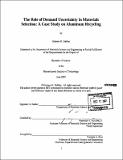| dc.contributor.advisor | Randolph E. Kirchain, Jr. | en_US |
| dc.contributor.author | Dabbas, Hashem H | en_US |
| dc.contributor.other | Massachusetts Institute of Technology. Dept. of Materials Science and Engineering. | en_US |
| dc.date.accessioned | 2008-11-07T18:49:33Z | |
| dc.date.available | 2008-11-07T18:49:33Z | |
| dc.date.issued | 2007 | en_US |
| dc.identifier.uri | http://hdl.handle.net/1721.1/42992 | |
| dc.description | Thesis (S.B.)--Massachusetts Institute of Technology, Dept. of Materials Science and Engineering, 2007. | en_US |
| dc.description | "June 2007." | en_US |
| dc.description | Includes bibliographical references (leaves 53-54). | en_US |
| dc.description.abstract | Aluminum is a versatile material that is used frequently in transportation and packaging, two industries with substantial recent growth. The increase in demand for aluminum, however, has outpaced the growth of primary aluminum production. One way to meet this shortfall is the use of secondary, or recycled, materials which provides both economic and environmental benefits. The increased use of secondary materials is limited by numerous factors; one such factor of concern is uncertainty. One form of uncertainty that all producers face is consumer demand; this will be the focus of this study. The two stage recourse optimization model presented in this thesis aims to provide batch planners with a tool to effectively manage raw materials in an uncertain demand environment. This model enhances existing research by increasing the number of demand scenarios considered by an increase in the model's resolution. The two metrics evaluated are scrap purchased and production cost. The batch planning process is affected by a number of assumptions about factor inputs including the model resolution, salvage value, coefficient of variation, scrap cost and compositional constraints. Results show that understanding the influence of these factors provides producers with the insight and ability to effectively manage and mitigate the effects of demand uncertainty in a cost minimization framework. | en_US |
| dc.description.statementofresponsibility | by Hashem H. Dabbas. | en_US |
| dc.format.extent | 54 leaves | en_US |
| dc.language.iso | eng | en_US |
| dc.publisher | Massachusetts Institute of Technology | en_US |
| dc.rights | M.I.T. theses are protected by
copyright. They may be viewed from this source for any purpose, but
reproduction or distribution in any format is prohibited without written
permission. See provided URL for inquiries about permission. | en_US |
| dc.rights.uri | http://dspace.mit.edu/handle/1721.1/7582 | en_US |
| dc.subject | Materials Science and Engineering. | en_US |
| dc.title | The role of demand uncertainty in materials selection : a case study on aluminum recycling | en_US |
| dc.type | Thesis | en_US |
| dc.description.degree | S.B. | en_US |
| dc.contributor.department | Massachusetts Institute of Technology. Department of Materials Science and Engineering | |
| dc.identifier.oclc | 233639713 | en_US |
